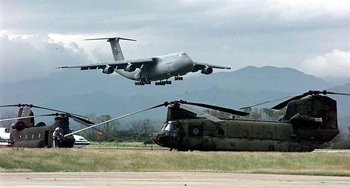
Moderators: Elvis, DrVolin, Jeff
The de facto government of Honduras has received $150 million from the International Monetary Fund even though President Manuel Zelaya was ousted in a coup in June.
The Special Drawing Rights from the Washington-based lending agency will be used to boost its dollar reserves, Honduras' central bank said Tuesday. It will receive an additional $14 million in the next few weeks, it added.
In April, the IMF agreed to issue its member countries $250 billion in Special Drawing Rights (SDR), a mechanism to improve liquidity by printing new money to counteract the effects of the global economic crisis. Mexico and Nicaragua received similar issues last week.
WASHINGTON (Reuters) – U.S. State Department staff have recommended that the ouster of Honduran President Manuel Zelaya be declared a "military coup," a U.S. official said on Thursday, a step that could cut off as much as $150 million in U.S. funding to the impoverished Central American nation.
The official, who spoke on condition he not be named, said State Department staff had made such a recommendation to U.S. Secretary of State Hillary Clinton, who has yet to make a decision on the matter although one was likely soon.
Washington has already suspended about $18 million aid to Honduras following the June 28 coup and this would be formally cut if the determination is made because of a U.S. law barring aid "to the government of any country whose duly elected head of government is deposed by military coup or decree."
The official said that $215 million in grant funding from the U.S. Millennium Challenge Corporation to Honduras would also have to end should Clinton make the determination that a military coup took place.
About $76 million of that money has already been disbursed and a second U.S. official said this implied that the remaining roughly $139 million could not be given to Honduras should the determination be made.
Sounder wrote:Bump and thanks smallprint, those folk over at narconews have got it going on.
Our Constitution does not allow Congress to remove a president from office, as it did under Micheletti's direction on June 28. The judicial actions invoked to justify the detention of the president also go against our Constitution. Micheletti's regime deported President Zelaya from the country without even trying him for an alleged crime, something to which even the worst criminal has a right.
Moreover, on top of being unconstitutional, the vote to approve the destitution of Zelaya was not transparent. I am a member of our Congress' Executive Committee, yet I was not summoned to participate in the vote to approve the president's removal, nor were another 20 fellow Liberal Party members of Congress. The regime then tried to fool the world by claiming there was a unanimous congressional decision supporting the coup, even though some 27 congress members publicly voiced their opposition.
The international community has rejected the de facto regime's belated legal, moral and political justifications for the coup. This was not only a coup d'etat against President Zelaya, but a coup against all the leaders and institutions of the Americas. It could have a destabilizing effect on the region, and act as a distraction from grave problems such as terrorism, poverty and climate change.
The question remains: How far is the Obama administration willing to go to pressure the de facto government? If it stands by and allows the consolidation of the coup, Latin American leaders will have serious doubts about the administration's intentions to rebuild diplomatic and political relations with other countries, and to its commitment to democracy.
Clearly, what is needed from the United States are targeted sanctions, designed in a way that will avoid hurting the poor, but will pressure the coup plotters to accept the proposal of Costa Rican president and mediator Oscar Arias, which President Zelaya has already endorsed. The U.S. should freeze the de facto regime leaders' U.S.-based assets, and revoke their visas, as the U.S. State Department has already started to do.
The U.S. should also join the Union of South American Nations and Mexico in refusing to recognize the outcome of November's elections. Since the electoral process would be held under a de facto regime that has suppressed all constitutional liberties, civil guarantees and the freedom of expression, conditions for free and fair elections will be impossible, and some politicians who have publicly denounced the coup now face reprisals and retaliation for their ties to President Zelaya.

Users browsing this forum: No registered users and 11 guests